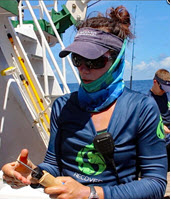
Laboratory studies at the University of Miami suggest that exposure to Deepwater Horizon oil may have negatively affected heart function in mahi-mahi, reducing their ability to swim efficiently. Lela Schlenker is expanding that research to investigate if and how oil exposure alters the way mahi-mahi migrate and respond to predators and prey in the wild. She conducts her research using different approaches: one focusing on mahi-mahi’s ability to smell and another that uses satellite tagging to monitor mahi-mahi’s behavior after encountering oil.
Lela is a Ph.D. student with the University of Miami’s Rosenstiel School of Marine and Atmospheric Science and a GoMRI Scholar with RECOVER.
Her Path
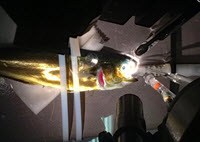
Lela began her environmental undergraduate studies at Smith College but wasn’t sure if she felt more drawn to terrestrial biology or marine science. A study-away maritime science program with the Williams-Mystic Program gave her the opportunity to experience marine science hands-on and inspired her to continue on that path. She designed an independent project for the course that involved collecting samples aboard a commercial fishing vessel. “It was an eye-opening experience to see all the amazing critters that we were catching and getting to talk to fishermen who have an incredible knowledge base and skillset. The intersection of the biological and human aspects of the fishing really struck me,” said Lela.
The experience inspired Lela to pursue various fisheries-based jobs after completing her undergraduate degree. One of these jobs brought her to the Dauphin Island Sea Lab just months after the Deepwater Horizon incident occurred. Seeing the spill’s initial effects first-hand inspired her to someday explore the oil’s impacts on Gulf ecology and fishing communities. While completing a master’s degree in fisheries science at the College of William and Mary, she learned about Dr. Martin Grosell’s mahi-mahi research at the University of Miami and contacted him about a possible student research position. Grosell thought Lela would be a good fit for his lab; however, he couldn’t hire her unless his proposed RECOVER project received GoMRI funding.
“Whether or not I could come to Rosenstiel and do my Ph.D. completely hinged on that grant,” said Lela. “I got an email from him right after the grant came in asking me to come for an interview. I wouldn’t be here if it weren’t for GoMRI funding. GoMRI has been instrumental in my career – having funding like this is a really rare and exciting opportunity!”
Her Work
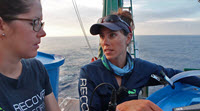
Lela assesses how oil exposure affects mahi-mahi’s ability to smell using an electro-olfactogram. She sedates the fish and removes a thin layer of skin from the nostril (septum) to uncover the olfactory rosette – finger-like projections covered in neurons. The fish is fitted with highly conductive electrodes that attach to the animal’s skin and on the rosette. She then delivers seawater with different scents (unscented, prey-scented, and predator-scented) directly to the rosette and measures voltage changes in the neurons in response to each smell. Greater changes in voltage indicate a stronger neurological response and, therefore, a stronger ability to detect the scent. She then dilutes the scent incrementally to determine how faint the smell must be before the fish can no longer detect it.
The next phase of Lela’s olfactory research will expose mahi-mahi to oil and observe if and how their sense of smell changes compared to control fish. A diminished ability to track prey and sense predators via smell could have significant implications for the fish’s survival, migration patterns, and spawning behavior.
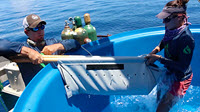
Lela will also be conducting satellite tagging experiments that build upon previous tagging field experiments. This summer, her team will capture wild mahi-mahi, rest them in water tanks containing seawater or seawater plus oil, fit the fish with satellite-enabled tags, and release them from the same location. The tags will relay temperature, depth, light level, and location information back to the researchers, who will use it to identify differences in swimming speed, spawning behavior, and migration patterns between the control and oil-exposed fish. “Our tagging research will help us understand how [previous findings that oil affects mahi-mahi physiology] would manifest in the wild and, if the fish were exposed to oil during a spill, how they would cope and what recovery may or may not look like,” she said.
Her Learning
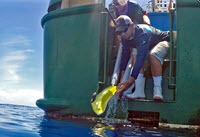
The greatest lesson that Lela has learned working alongside Grosell is the importance of being an optimist and making bold choices. Previous studies documenting mahi-mahi behavior experienced many challenges from limited resources to difficulties handling and tagging the wild fish, something Lela was aware of when her team’s research began. She was inspired by Grosell’s determination to improve the research methods to collect better data and include oil as an additional variable. “It was a little scary when he told me we were going to take this thing that no one else has been able to do and then make it harder by adding the oil,” said Lela. “It was a good lesson that sometimes you just have to be bold and go for it and if you can figure out a way to make it happen, then you’re going to conduct exciting research that no one else has been able to do.”
Her Future
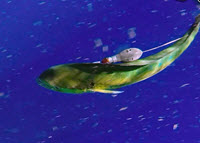
Lela hopes to continue working in a collaborative research environment after graduation, particularly in a position that also allows her to teach and spark the passion she feels for science in others. She advises students considering a scientific career to explore different avenues before entering graduate school to help solidify which aspects of science they want to pursue. “Taking the time to do different jobs and figure out exactly what you like about scientific research can be really helpful,” said Lela. “It’s not bad to try a lot of different things, especially when you’re in college or right out of college. There’s a lot of different experiences out there, and you never really know where things will lead.”
Praise for Lela
Dr. Grosell commended Lela’s unique dissertation research, which spans several levels of biological organization and offers a refreshing, integrative view of oil impacts on large marine pelagic organisms. He added that she previously led a research cruise and will act as lead scientist for an upcoming cruise in the Gulf of Mexico this summer. “As lead scientist, Lela demonstrates a rare talent for leadership and pursuing challenging directions while promoting a supportive and collegial atmosphere,” said Grosell. “I am grateful to have Lela in my group and continue to learn from her.”
The GoMRI community embraces bright and dedicated students like Lela Schlenker and their important contributions. The GoMRI Scholars Program recognizes graduate students whose work focuses on GoMRI-funded projects and builds community for the next generation of ocean science professionals. Visit the RECOVER website to learn more about their work.
************
The Gulf of Mexico Research Initiative (GoMRI) is a 10-year independent research program established to study the effect, and the potential associated impact, of hydrocarbon releases on the environment and public health, as well as to develop improved spill mitigation, oil detection, characterization and remediation technologies. An independent and academic 20-member Research Board makes the funding and research direction decisions to ensure the intellectual quality, effectiveness and academic independence of the GoMRI research. All research data, findings and publications will be made publicly available. The program was established through a $500 million financial commitment from BP. For more information, visit https://gulfresearchinitiative.org/.
© Copyright 2010-2018 Gulf of Mexico Research Initiative (GoMRI) – All Rights Reserved. Redistribution is encouraged with acknowledgement to the Gulf of Mexico Research Initiative (GoMRI). Please credit images and/or videos as done in each article. Questions? Contact web-content editor Nilde “Maggie” Dannreuther, Northern Gulf Institute, Mississippi State University (maggied@ngi.msstate.edu).
